Very end then of land. What vast is here?
The drowning saving while, the threshold sea
Always is here. You may not move away.
W S Graham, The White Threshold, 1948. [1]
Photographs can be a bit like poems. There are those that speak to you in such a personal way and evoke such strong feelings, and yet you might be unable to put into words just what exactly it is about them that sparks all those emotions. That is the case for me, at least. Whenever I am out and about in nature, trying to capture a scenery on film, I have to think of W S Graham’s poetry. And whenever I read or listen to one of his poems while sitting at home, I am transported to those settings that are closest to my heart: the Hebrides, including the Isle of Skye, and Assynt, the northwesternmost ridges of the Highlands. His poetry creates a certain pull: a strange and phantastic wish to pack my bags and travel to the far reaches of Scotland.
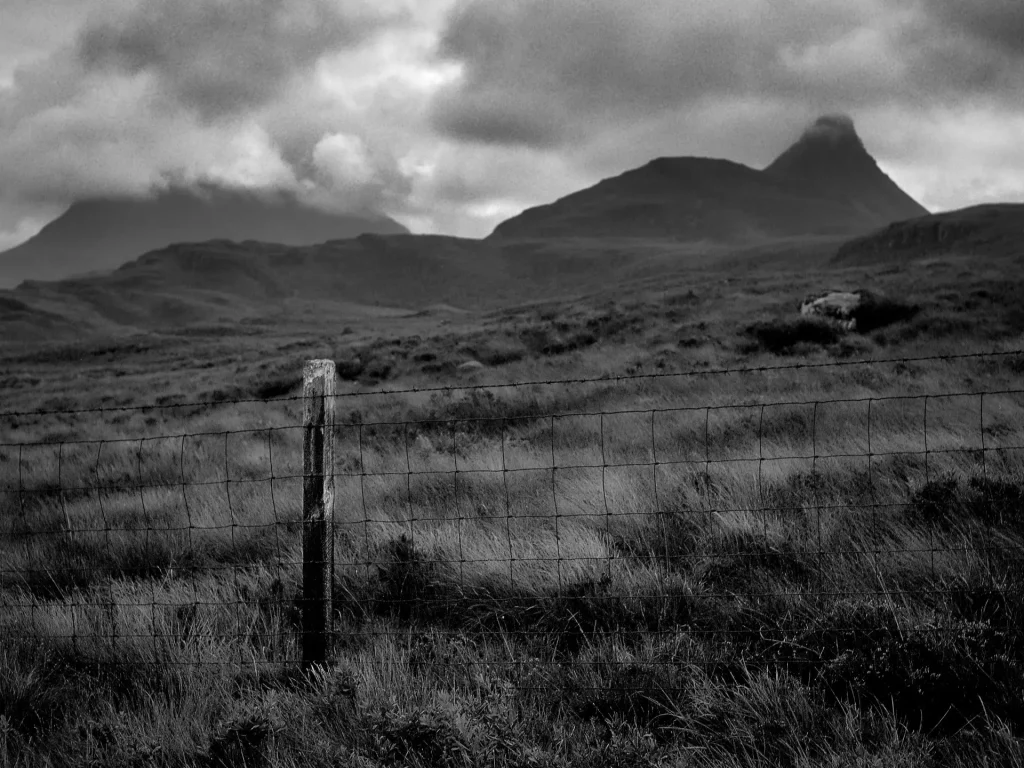
Graham wrote extensively about Scotland, though the Scotland of his poems often remains implied rather than explicitly stated, much like a hidden protagonist lurking from between the line breaks. Born in Greenock, just across the Clyde from Loch Lomond, in 1918, and trained as a draughtsman in Glasgow, he spent most of his adult life living in Cornwall where he died in 1986. Despite publishing a whole range of poetry books and collections, he might not be among the first Scottish poets that come to mind. During his lifetime, he was somewhat overlooked by a public readership. Perhaps the lights of contemporaries like Dylan Thomas and those of Graham’s poetic Scottish forebearers, like Robert Burns, shone just a bit too bright. Today, some 35 years after his death, this is changing. There is now a flagstone dedicated to him in Makar’s Court in Edinburgh and when you read about 20th century poetry, his name pops up more and more frequently. There are two poems I love in particular: The above quoted The White Threshold (1948) and his long poem The Nightfishing (1955). Online, you can find a beautiful recording of The Nightfishing from 1954 in which Graham’s voice and words form a near perfect poetic soundscape.
I have always felt a strong draw to the rough sceneries Graham conjures; to the stormy days at the seaside, standing atop a steep cliff or opposing the storm on a rocky beach, letting the wind sweep away all worries and sorrows, to take in instead that strangely comforting impression of insignificance in the face of the imposing, never ending water, while sensing the sea spray on my cheeks, tasting the slightly salty drops on my lips. It is cold, even in summer, but it is a comforting cold with your hands deep in your pockets, wrapping the fabric of your coat around your torso as tightly as you possibly can. The feeling of awe, the realisation of the vastness of the wild sea in front of you. If you close your eyes, all you hear is the rush of air in your ears and the crushing of waves against the bare stone, and, perhaps, the flapping of the coat’s hem against your legs, or a gull circling above. On such days, the ocean is coloured like the flint that I used to collect as a child when my family and I would visit my grandparents by the Baltic Sea. That dark blueish black that gains a hint of green translucency when you hold it against the light, and which is covered with white spots like sea foam capping a wave rolling onto shore. Stones full of love and mystery.
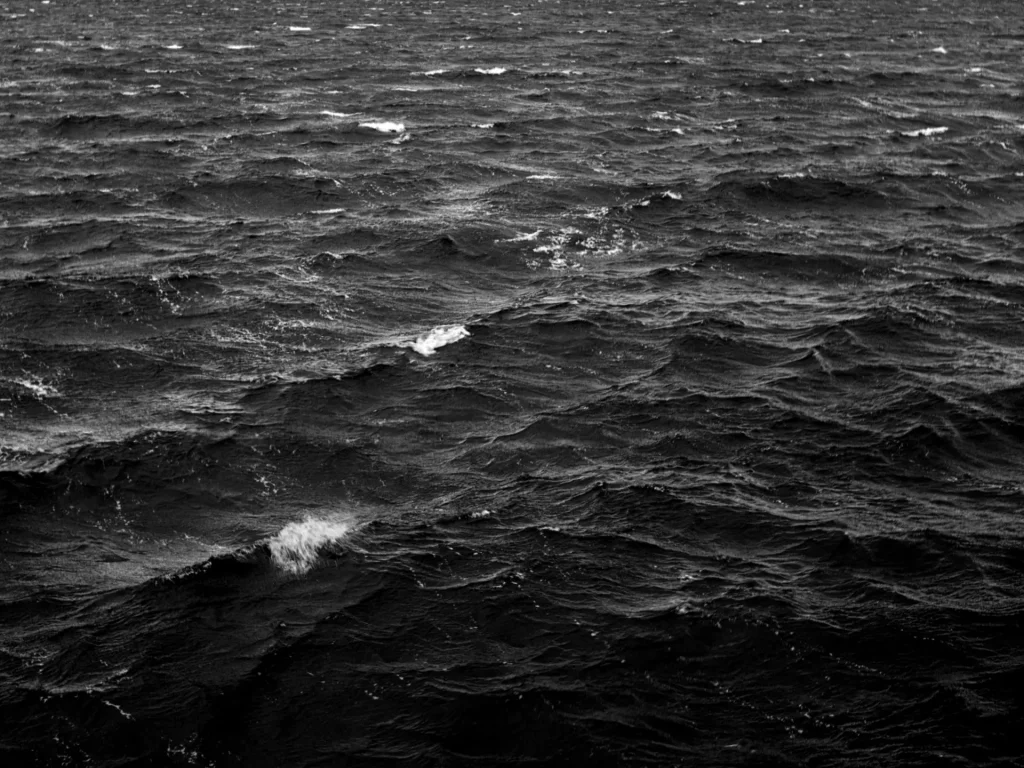
There is more than the one sea there. Just behind the next turn in the coastal road, across the bridge over the loch: the seemingly inhospitable swathes of windswept grass or a bog blanketed with moss, only interrupted by a menacing craig or the defensive side of a lone mountain. If you listen closely, you can still make out the roar of the surf carried over the hills from yonder; or it might be your mind playing tricks on you, turning the grass into waves moved by the wind. The sky looks different there, too – if you catch the right time of year and day, you can see the clouds coming in from across the seas, slowly building up to towering formations, promising a crescendo of lightning, thunder, and rain, and yet, more often than not, just adding a melancholic, vertical mizzle to the scene. The clouds move on to cause heavenly havoc further inland. You look after them. And suddenly: A ray of sunshine breaks through the grey, illuminating the tree growing on the craig, the rock peeking through the grass, the side of the lone mountain facing the elements on its own, day in, day out. The ray is turning the bog into a mirror, the beach into a sea of glistening specks of light. Suddenly, there is detail in the monotone cliffside, you can make out the sheep grazing on the grassy hills, just small moving white dots in the distance. Do you see the old house peeking through the treeline? The waterfall making its way through the karst? And just when you do, in that second, the cloud cover closes, the light vanishes, the gust picks up again.
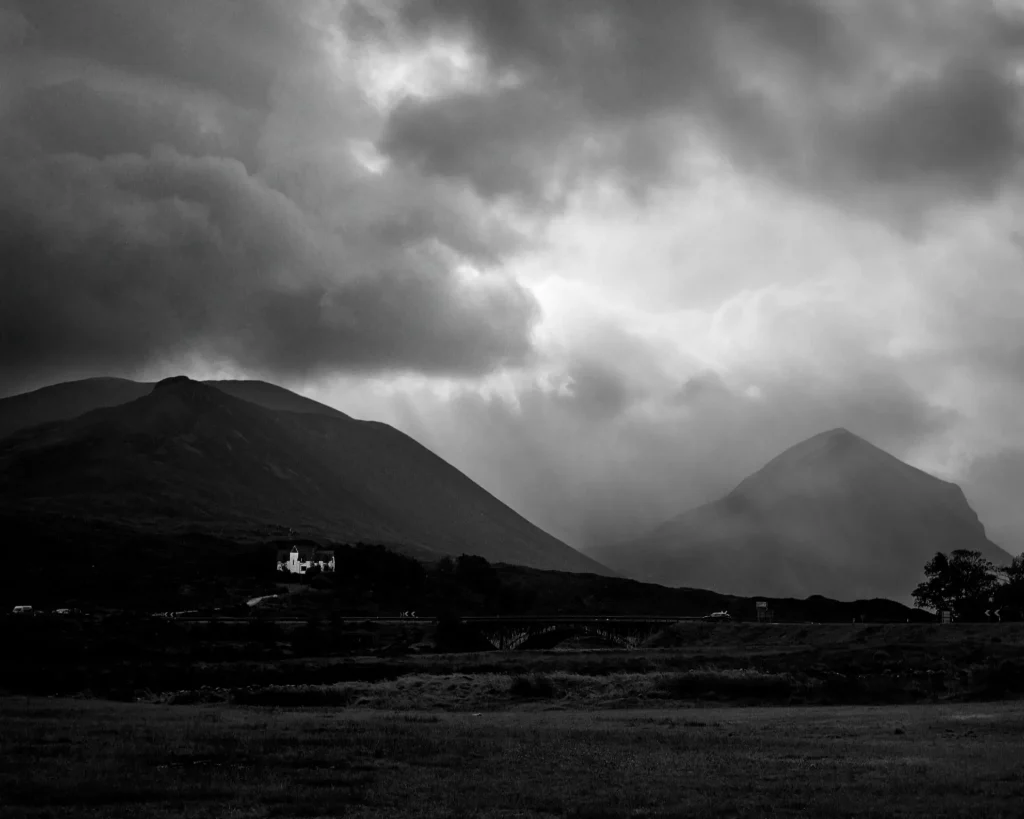
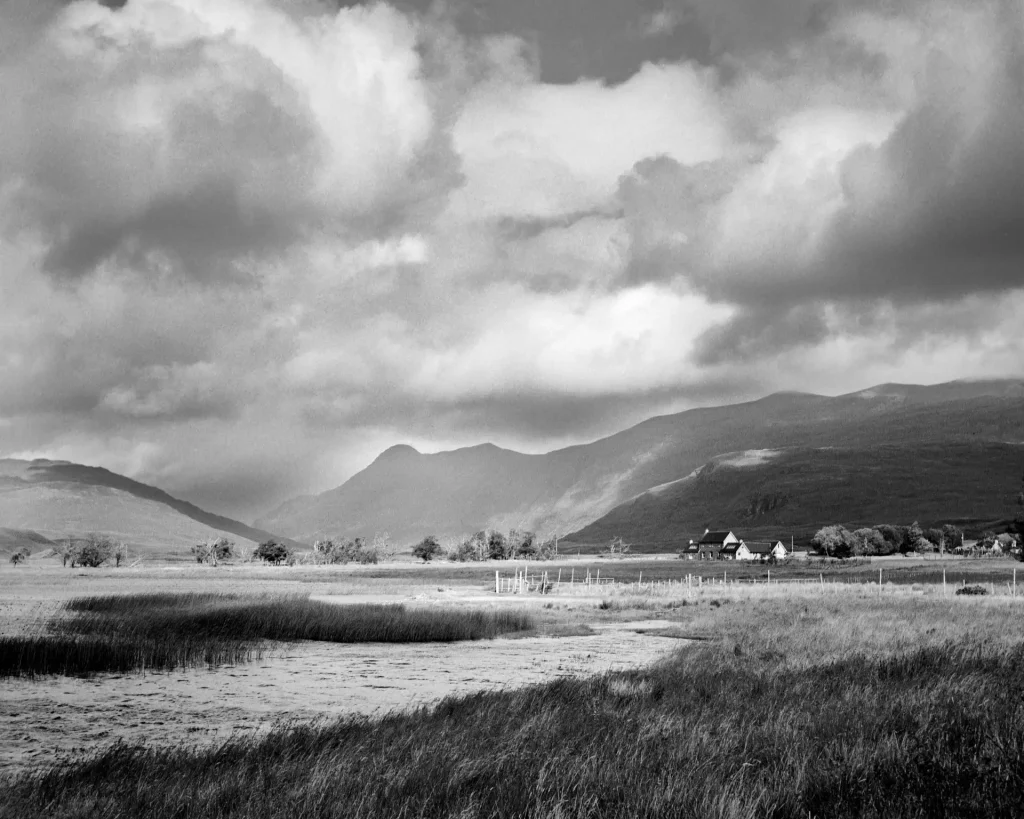
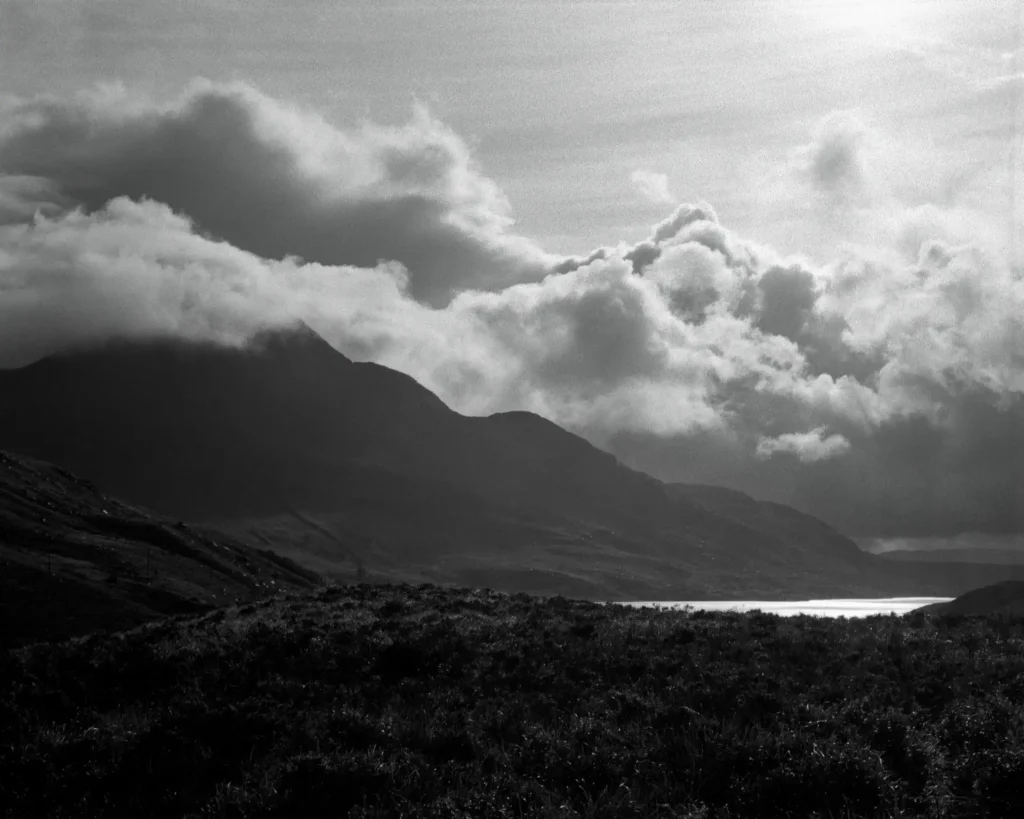
When you turn around and the wind lifts your collar against your ears, or when you cower into a sheltered corner behind the quay wall, the wondrous immersion ends. Suddenly, you are alone with yourself. With your ears covered, your thoughts become the lone sounds in a sea of silence. There are only few situations in which you can consciously experience a coming back to your senses – the drawn-out moment of awareness, when you fully realise the details that surround you, when the wide gaze of insignificance turns into the narrowed view of cognizance. You notice the old rustling chain lying on the fissured stone, the lobster cages piled up 7ft, loomingly swaying from side to side, the gull suspiciously inching ever closer to your lunch sandwich. And you know that as soon as you turn around again, as soon as you step out of your hiding place, the beautifully monstrous sea is still there. It is that moment of calm that lets you find hope in the realisation of complete awe.
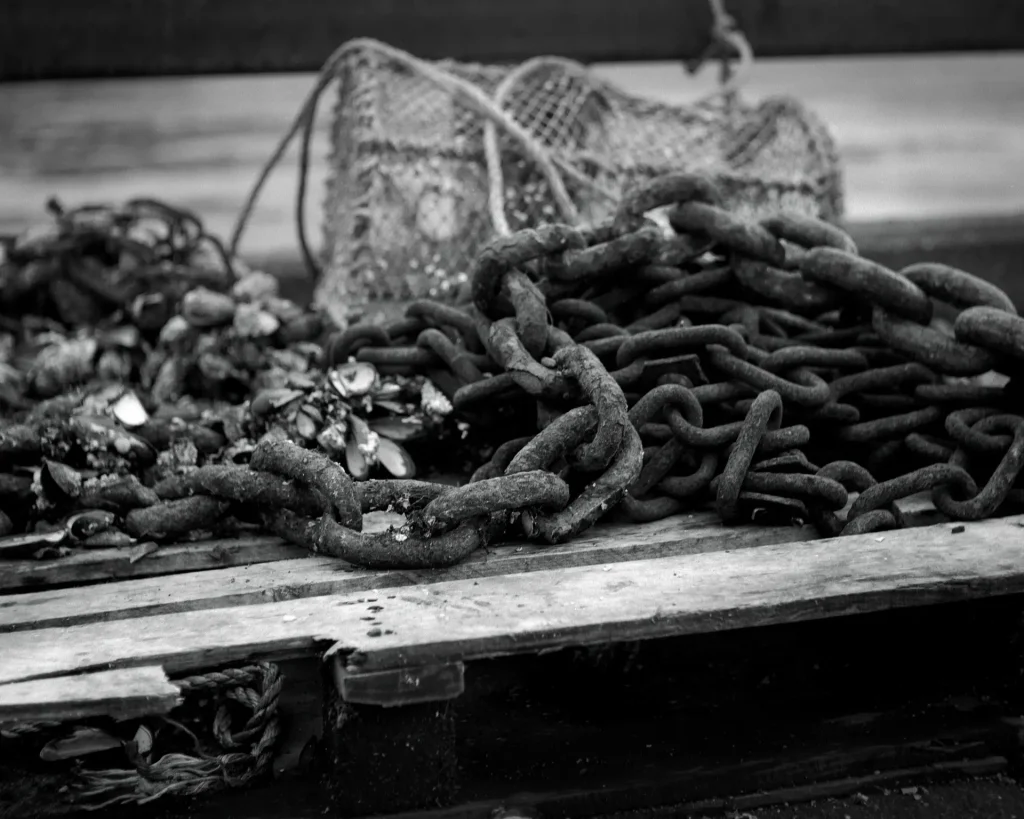
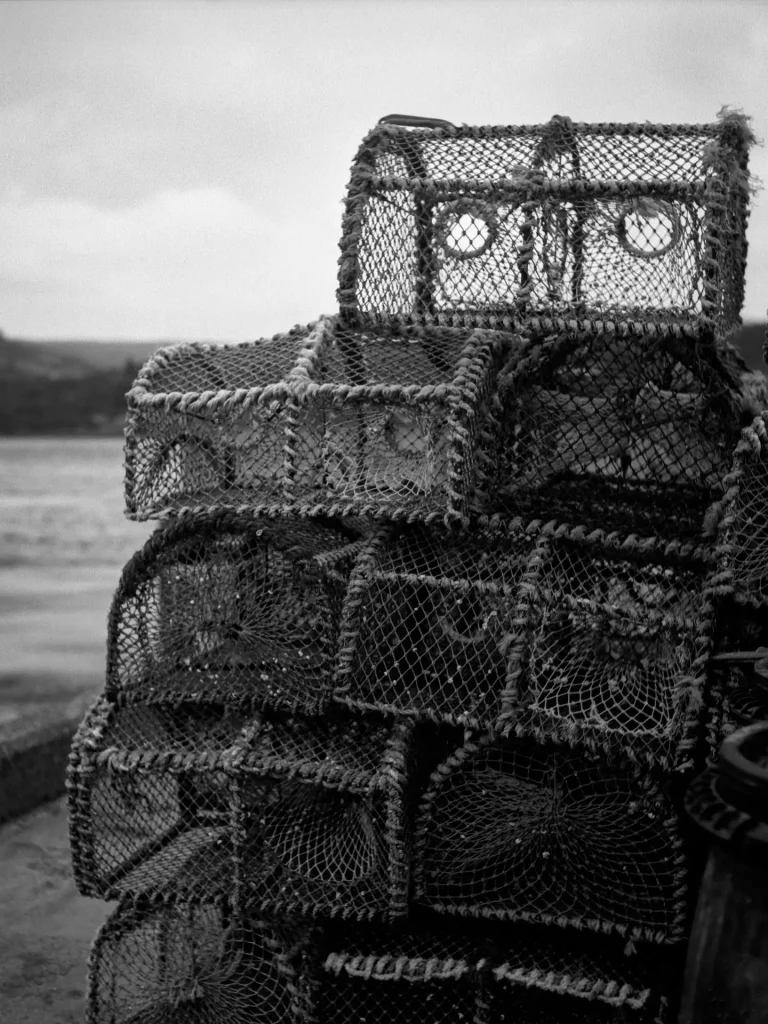
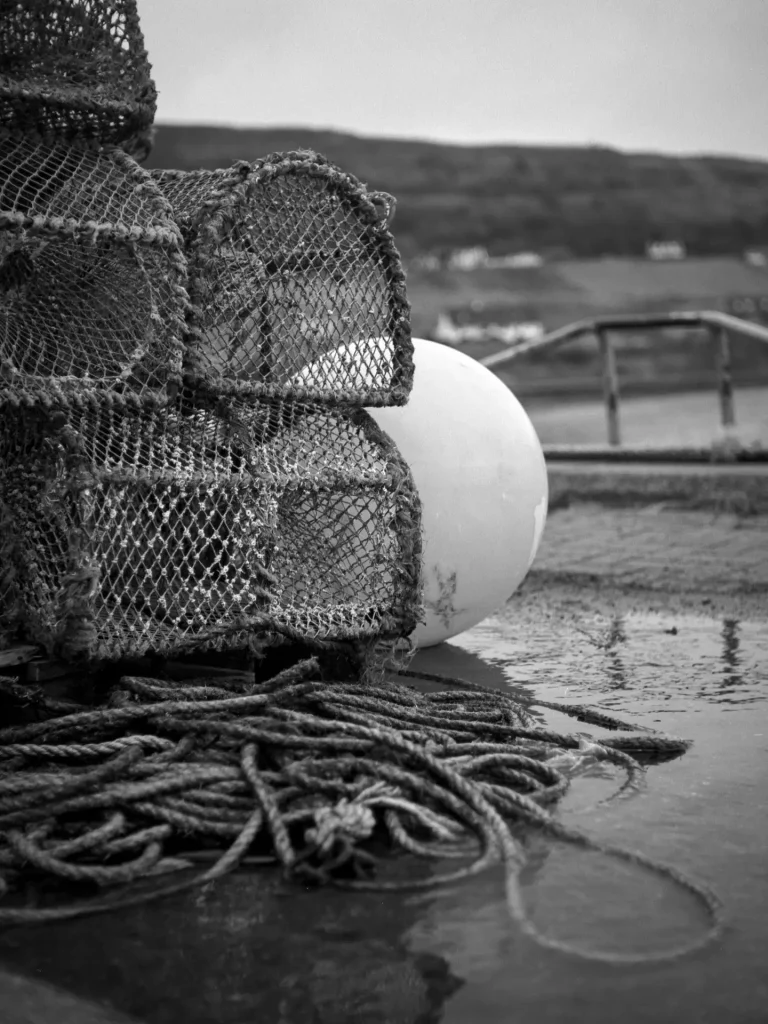
I never thought much about the meaning of my own photography. Of course, there had always been a drive to improve my technique, be it the process of taking the photo or at the stage of ‘making’ the image in the darkroom, and an awareness of the joy of interacting with the subject of my photographs, having a laugh with the kind friend who agreed to having their portrait taken, later feeling grateful for the trust that somebody had put into me when asking me to take a headshot or capture their special day, or enjoying to carefully composition a landscape that I came across on a walk or hike. But ‘meaning’ felt like such a big word for something that, for me, started as a diversion, a reason to go out and explore my surroundings or to meet up with like-minded friends. I think this changed when I first visited Scotland, when the process of taking a photo assumed a special, purely personal meaning. I knew that arresting feeling of awe, but never before that trip had I consciously sought it out. Right in time when I needed it, Skye and Assynt gifted me daily impressions of beauty and endurance. These photos were my timid attempts at capturing all those emotions. ‘Meaning’ can be something we find just for ourselves.
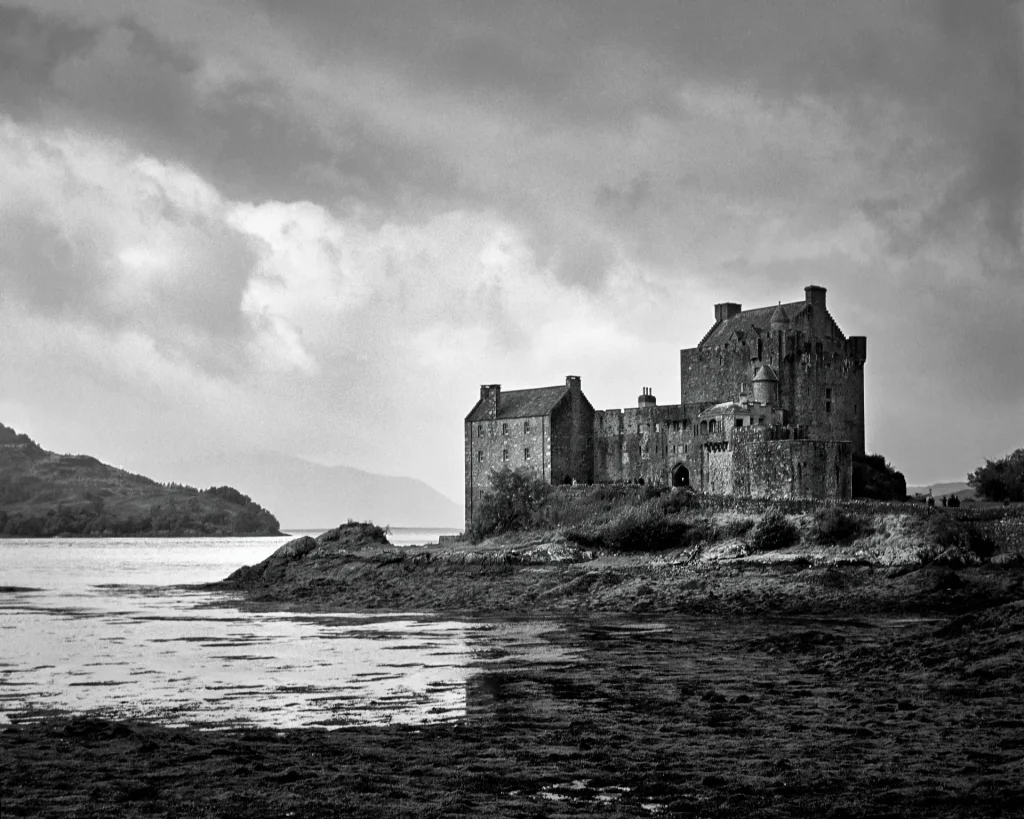
In The Nightfishing, a poem describing a stormy yet life re-affirming night fishing for herring off the Scottish coast, Graham writes of ‘the sea as a metaphor of the sea.’ So, in that sense, these are not really photos of Scotland at all, but rather of Scotland as a metaphor of what Scotland means to me. The English poet and scholar Tony Lopez interprets the core of The Nightfishing as being its ‘constructed silence, an experience of aloneness out at sea and under the constellations at night’ which ‘communicates a spiritual awareness’. [2] Through this silence, existing in between the storm and the exertion of fishing and the simultaneous deep introspection of his protagonist, Graham creates a powerful narrative that lets me dream myself to the top of a Skye cliff or the edges of a rocky Durness beach or the entrance of a vast Assynt moorland. With my photos I tried to essentialise that experience, to preserve those aspects of the sceneries’ power that draw me into an alien, far away world, that is yet so immediately real. I will never be able to grasp exactly what Graham does with his words and apply it to landscape photography. But now, whenever I revisit these images, I feel reminded of being there, reminded of that fleeting moment of calm and aloneness. And of the white threshold, the lamenting sea.
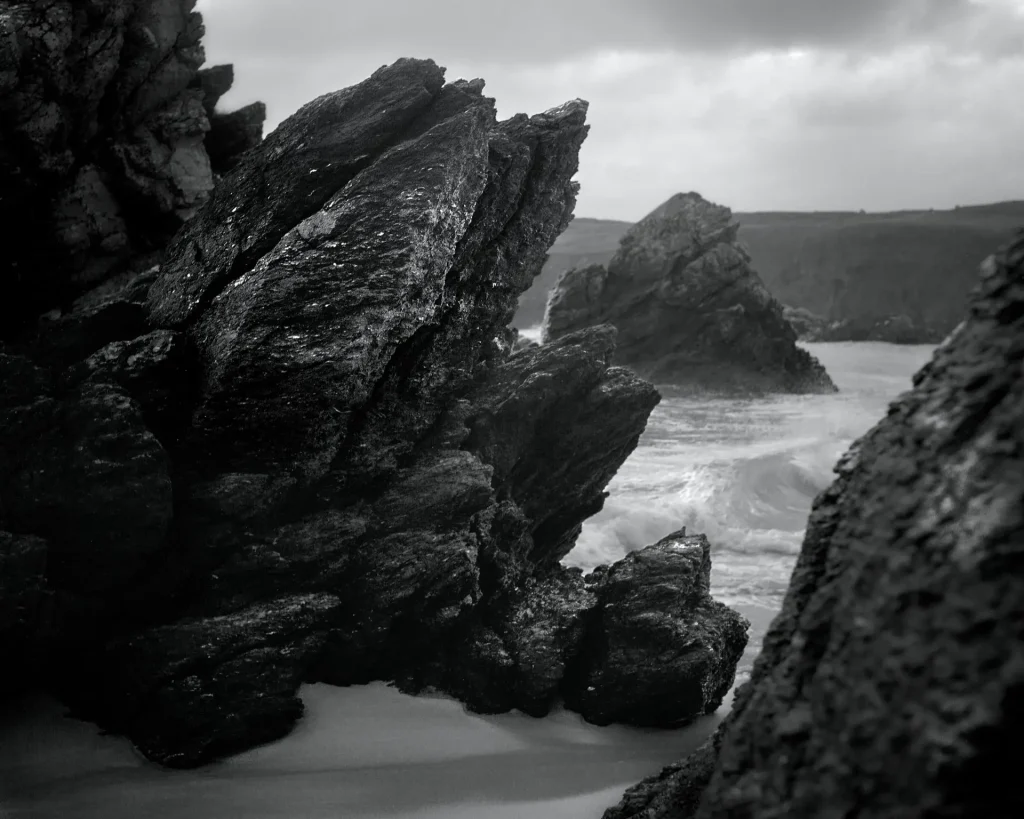
There are a few verses from the very beginning of The Nightfishing that I had to think of in particular while writing this:
Very gently struck
The quay night bell.Now within the dead
Of night and the dead
Of my life I hear
My name called from far out.
[…]
Yet this place finds me
And forms itself again.
This present place found me.
Owls from on the land.
Gulls cry from the water.
[…]
Far out faintly calls
The continual sea.Now within the dead
Of night and the dead
Of all my life I go.
W S Graham, The Nightfishing, 1955. [3]
I do not think that there has ever been a place that faintly called me from far out and found me quite like the Hebrides and the Western Highlands. You might have such a place as well. And perhaps you, too, have taken photos of that special place. Photos to which you like to close your eyes; to longingly reminisce, in moments in which nothing but the roaring thunder in front of you and the salty sea spray on your cheeks and lips can make things right. Perhaps you, too, find something in these photos – and be it just the wish to visit Skye and Assynt yourself. If you have the chance, take it.
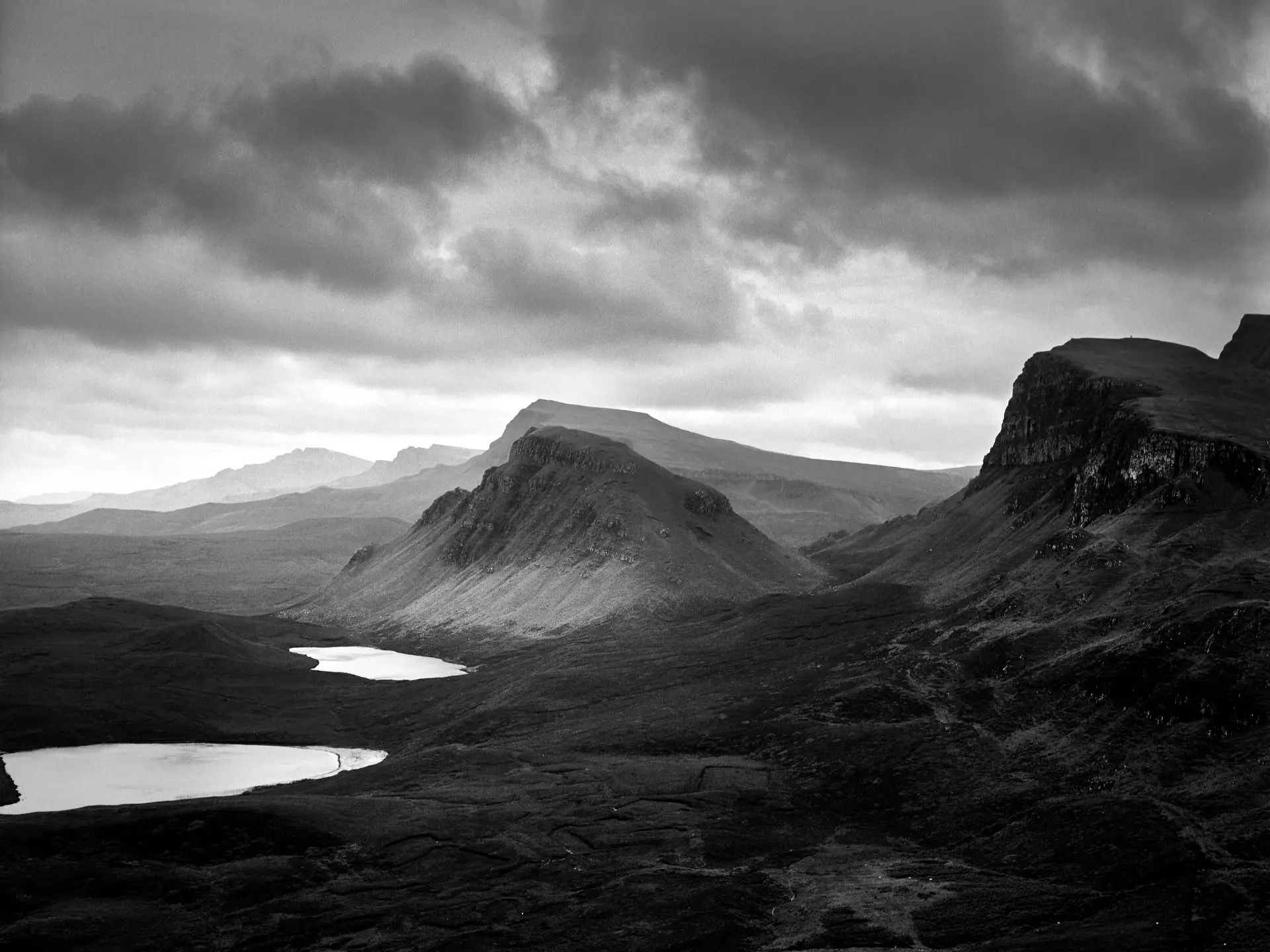
All photos taken by Jasper Theodor Kauth in September 2019 on a Rolleicord Vb Type I medium-format TLR sporting a Schneider-Kreuznach Xenar 75mm 1:3.5 taking lens.
You can find me on and contact me through instagram and my website.
Film and developer combinations:
Quiraing (Skye): Ilford Delta 100, XTOL 1:1
Stac Pollaidh (Assynt): Ilford FP4 Plus, HC-110B
Uig Seascape I, II, III, IV (Skye): Ilford Delta 100, XTOL 1:1
Cuillin Hills (Skye): Kodak TMY (T-Max 400), T-Max 1:4
Assynt I: Kodak TMY (T-Max 400), T-Max 1:4
Assynt II: Ilford FP4 Plus, HC-110B
Eilean Donan: Kodak TMY (T-Max 400), T-Max 1:4
Sango Sands (Durness): Ilford Delta 100, XTOL 1:1
Negatives scanned with an EPSON V550
[1] W S Graham: ‘The White Threshold’. The Swansea Review 56, no. 4 (1948): pp. 658-664.
[2] T Lopez: ‘Graham and the 1940s’. In W.S. Graham: Speaking Towards You, edited by Ralph Pite and Hester Jones, pp. 26-43. Oxford: Oxford University Press, 2004.
[3] W S Graham: The Nightfishing. London: Faber & Faber, 1955.
Share this post:
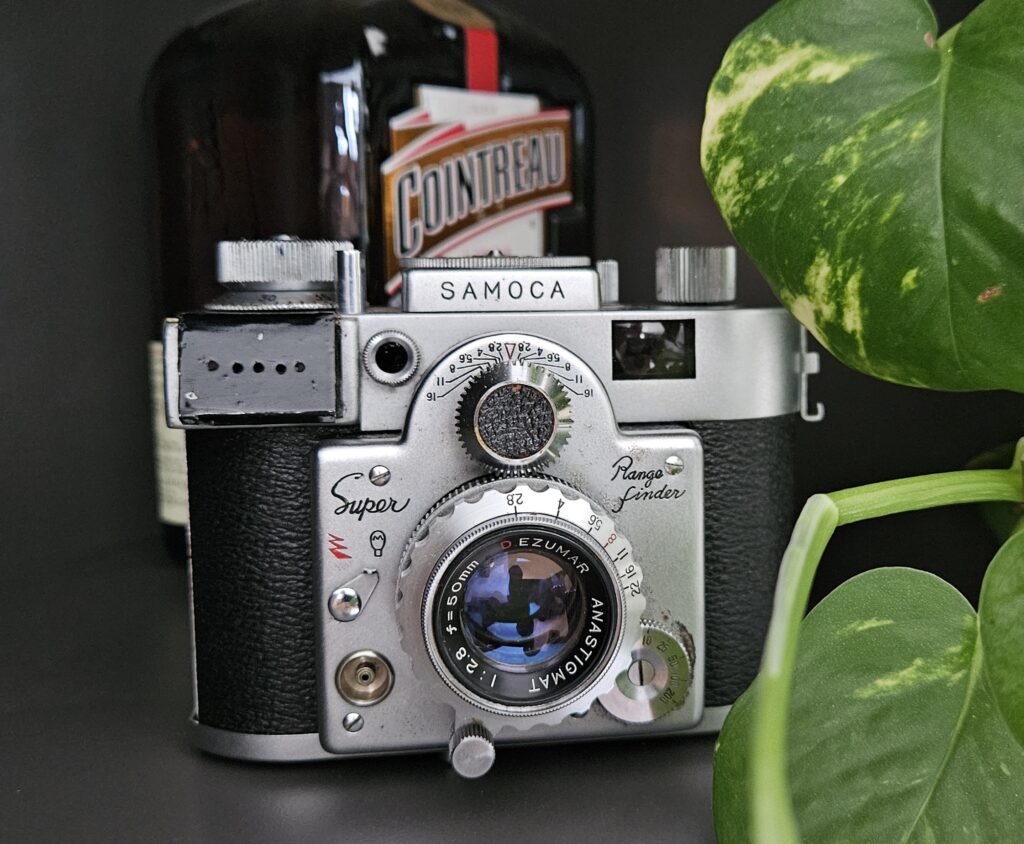







Comments
John Furlong on The Black & White Threshold – Photographing Scotland’s Skye and Assynt – By Jasper T Kauth
Comment posted: 06/04/2022
Many thanks.
Comment posted: 06/04/2022
Floyd K Takeuchi on The Black & White Threshold – Photographing Scotland’s Skye and Assynt – By Jasper T Kauth
Comment posted: 06/04/2022
Comment posted: 06/04/2022
Ralph Turner on The Black & White Threshold – Photographing Scotland’s Skye and Assynt – By Jasper T Kauth
Comment posted: 06/04/2022
Comment posted: 06/04/2022
Dean on The Black & White Threshold – Photographing Scotland’s Skye and Assynt – By Jasper T Kauth
Comment posted: 06/04/2022
Thank you sharing your words and images, and I shall listen to the poem tonight.
Take care, Dean.
Comment posted: 06/04/2022
John Barbour on The Black & White Threshold – Photographing Scotland’s Skye and Assynt – By Jasper T Kauth
Comment posted: 06/04/2022
Comment posted: 06/04/2022
Peter Roberts on The Black & White Threshold – Photographing Scotland’s Skye and Assynt – By Jasper T Kauth
Comment posted: 06/04/2022
I'm awed by your seamless blending of photographs and prose.
Thank you for introducing me to W S Graham.
Comment posted: 06/04/2022
Christopher Schwer on The Black & White Threshold – Photographing Scotland’s Skye and Assynt – By Jasper T Kauth
Comment posted: 06/04/2022
Comment posted: 06/04/2022
John Fontana on The Black & White Threshold – Photographing Scotland’s Skye and Assynt – By Jasper T Kauth
Comment posted: 06/04/2022
To be able to express how you felt the presence of the place around you when you made these images is the essence of photography. The emotions you describe, the ‘oneness’ with the land you have fallen in love with, is inspiring.
Thank you so much for sharing your images and words.
Comment posted: 06/04/2022
Tim Bradshaw on The Black & White Threshold – Photographing Scotland’s Skye and Assynt – By Jasper T Kauth
Comment posted: 06/04/2022
Comment posted: 06/04/2022
Rich on The Black & White Threshold – Photographing Scotland’s Skye and Assynt – By Jasper T Kauth
Comment posted: 06/04/2022
They remind me of the many hours I've spent on the beaches of Long Island, NY. While not at all craggy, the Atlantic crashing against the shore in the winter time - when most people safely stay home - is quite similar.
While we now live 5-6 hours from the coast of North Carolina, maybe DW and I can take a trip there to renew our souls.
Thanks again,
--Rich
Comment posted: 06/04/2022
Dan Mountin on The Black & White Threshold – Photographing Scotland’s Skye and Assynt – By Jasper T Kauth
Comment posted: 06/04/2022
Much as you are drawn to the rugged beauty of the Highlands and the Isle of Skye, I'm drawn to a the stark beauty of the Oklahoma Prairie....
Your photos are stunning!
Comment posted: 06/04/2022
Toby Van de Velde on The Black & White Threshold – Photographing Scotland’s Skye and Assynt – By Jasper T Kauth
Comment posted: 06/04/2022
I feel inspired to try some landscape work in Wales.
Comment posted: 06/04/2022
Philip Ahlquist on The Black & White Threshold – Photographing Scotland’s Skye and Assynt – By Jasper T Kauth
Comment posted: 07/04/2022
I find the connections between poetry and photography really fruitful. Interestingly, it often seems to be modern poetry that works best. It’s usually T S Eilot whose work is in my mind when walking with a camera, or sometimes Mary Oliver. But I’m definitely going to have to read W S Graham now - these passages are beautiful. And he has the advantage of Scottish seascapes to draw on, which is a subject close to my heart. I’m more used to the east coast but clearly I need to make a trip to Skye and the Western Isles before too long! Thanks again for this piece - just the sort of inspirational writing and photography that shows this community at its best.
Comment posted: 07/04/2022